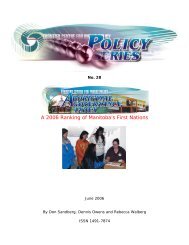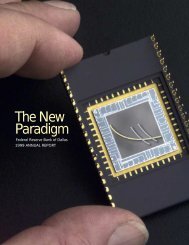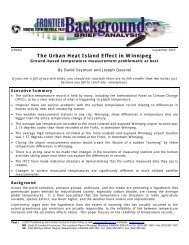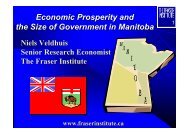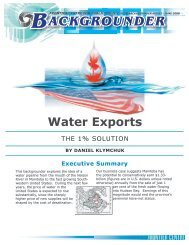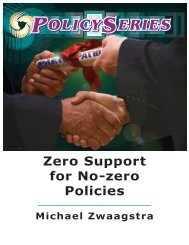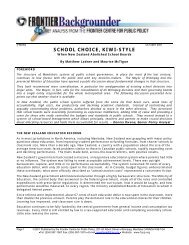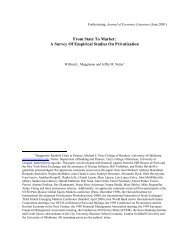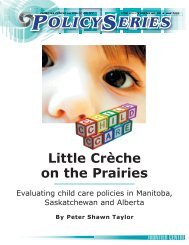View entire study as PDF - Frontier Centre for Public Policy
Create successful ePaper yourself
Turn your PDF publications into a flip-book with our unique Google optimized e-Paper software.
MONEY FOR NOTHING AND YOUR CHEQUES FOR FREE<br />
P O L I C Y S E R I E S<br />
Industry Canada and the politics<br />
of public deceit<br />
10<br />
“It is clear that the decline of a<br />
language must ultimately have<br />
political and economic causes: it is<br />
not due simply to the bad influence<br />
of this or that individual writer.”<br />
—George Orwell,<br />
Politics and the English Language, 1946<br />
Business subsidies arrive in a variety of<br />
<strong>for</strong>ms. The terms used by Industry Canada<br />
in cl<strong>as</strong>sifications to describe its subsidies<br />
to business, the focus of this report,<br />
are the following: grant, contribution,<br />
repayable contribution, conditionally<br />
repayable contribution, loan guarantee,<br />
interest contribution, conditional or<br />
unconditional repayable contribution,<br />
conditional grant and “other” <strong>as</strong>sistance.<br />
Curiously, the term “contribution” is<br />
conspicuously absent from news rele<strong>as</strong>es<br />
concerning taxpayer dollars awarded to<br />
corporations in Canada. Taxpayers make<br />
“contributions” to charitable organizations<br />
and do not expect to be repaid. They make<br />
“investments“ in the expectation of a<br />
return that is commensurate with the risk.<br />
Given that actual repayment terms will<br />
be protected from scrutiny by taxpayers<br />
and competitors, most corporations are<br />
com<strong>for</strong>table with implications that it is a<br />
business transaction where the money will<br />
be repaid. This misleads both the media<br />
that report on such disbursements and the<br />
wider public.<br />
FCPP POLICY SERIES NO. 88 • APRIL 2010<br />
“Repayable investment”<br />
instead of the more accurate<br />
“conditionally repayable<br />
investment”<br />
On January 13, 2009, Industry Minister<br />
Tony Clement announced a $52.3 million<br />
“repayable investment” given to Esterline<br />
CMC Electronics (Industry Canada, 2009a).<br />
The term “repayable investment” appears<br />
three times in the news rele<strong>as</strong>e. That<br />
language would lead an observer to<br />
conclude that Esterline CMC Electronics<br />
must repay the $52.3 million at some<br />
future date. Not necessarily.<br />
In fact, it is clear this $52.3 million is only<br />
“conditionally repayable” because it is<br />
described <strong>as</strong> such on a separate webpage<br />
of the department entitled Project Portfolio<br />
(Industry Canada, 2009b).<br />
“Repayable investment”<br />
instead of the more accurate<br />
“repayable contribution”<br />
which might be conditionally<br />
repayable<br />
Similarly, the Industry Canada March<br />
31, 2009 news rele<strong>as</strong>e <strong>for</strong> the $250<br />
million given to CAE Inc. uses the term<br />
“repayable investment” six times, while<br />
the term “conditional” is nowhere to be<br />
found. However, when cross-referenced<br />
with the department’s own Project<br />
Portfolio, the $250 million given to CAE<br />
Inc. is in fact cl<strong>as</strong>sified <strong>as</strong> a “repayable<br />
contribution.” If that term seems to<br />
support the public language used in the<br />
media rele<strong>as</strong>e, such an <strong>as</strong>sumption would<br />
be too optimistic.<br />
© 2010<br />
FRONTIER CENTRE




